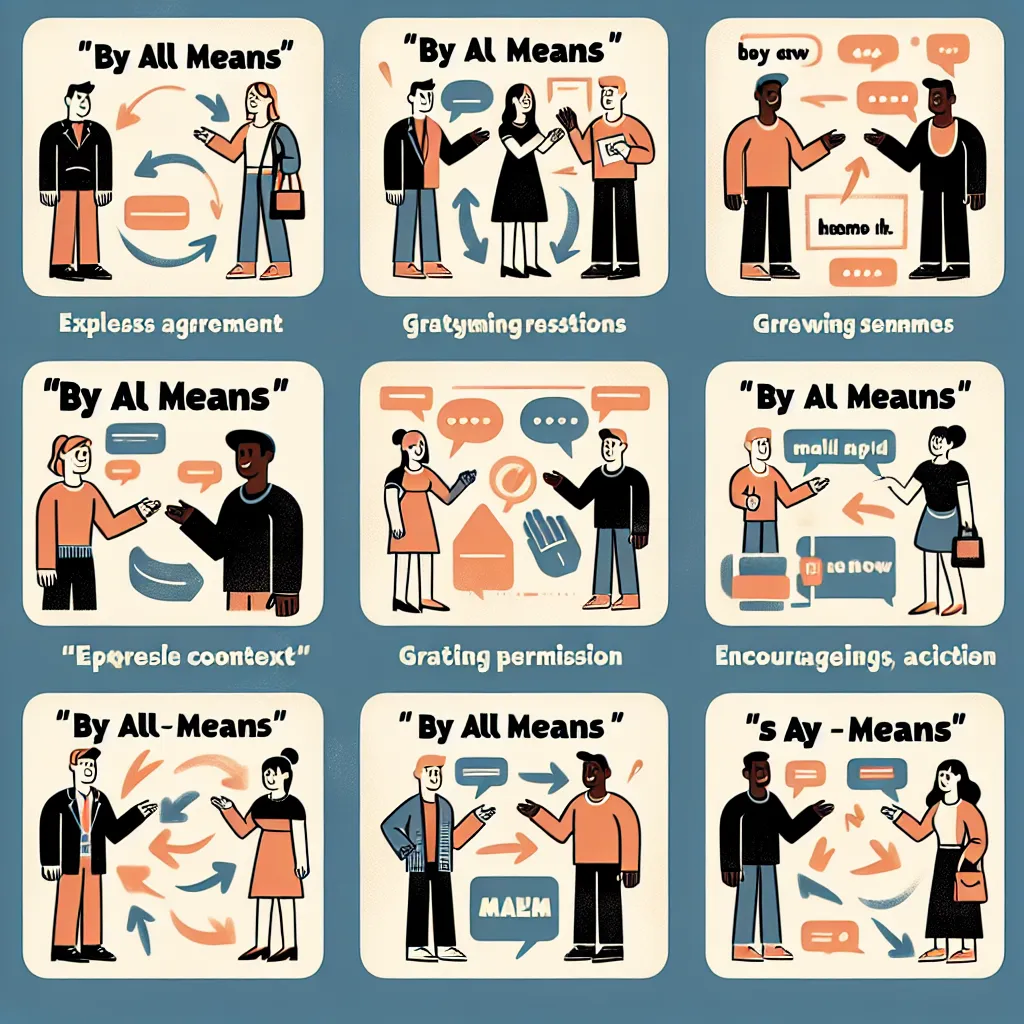The phrase “by all means” is a versatile and commonly used expression in English that can significantly enhance your IELTS performance when applied correctly. In this article, we’ll explore its meaning, usage, and provide practical examples to help you incorporate it effectively in your IELTS exam.
Understanding “By All Means”
“By all means” is an idiomatic expression that essentially means “certainly” or “of course.” It’s used to give strong agreement or permission to do something. This phrase appears frequently in both spoken and written English, making it valuable for all sections of the IELTS exam.

Meaning and Usage
- To give enthusiastic permission or agreement
- To encourage someone to do something
- To emphasize the importance or urgency of an action
Let’s look at some examples:
- “Can I borrow your pen?” “By all means, go ahead!”
- “If you want to improve your English, by all means, practice every day.”
- “By all means, feel free to ask questions during the presentation.”
- “We should, by all means, consider all options before making a decision.”
- “If you have the opportunity to study abroad, by all means, take it!”
In each of these sentences, “by all means” emphasizes the speaker’s strong agreement or encouragement. It’s a more emphatic way of saying “yes” or “certainly.”
Grammar and Structure
When using “by all means” in sentences, it’s important to understand its grammatical function and placement.
Formula and Grammatical Points:
[Subject] + [Verb] + by all means + [Rest of the sentence]
or
By all means, + [Imperative sentence]
Key points to remember:
- “By all means” is an adverbial phrase.
- It can be placed at the beginning, middle, or end of a sentence.
- When used at the beginning of a sentence, it’s often followed by a comma.
- It’s commonly used with imperative sentences (commands or strong suggestions).
Applying “By All Means” in IELTS
IELTS Speaking
In the Speaking test, using “by all means” can demonstrate your command of idiomatic expressions and add emphasis to your responses.
Example:
Examiner: “Would you mind explaining that point further?”
You: “By all means! I’d be happy to elaborate on that.”
IELTS Writing
In Writing Task 2, “by all means” can be used to express strong agreement or to introduce a suggestion emphatically.
Example:
“While some argue against stricter environmental regulations, we should by all means implement stronger measures to protect our planet.”
IELTS Listening
In the Listening test, you might hear “by all means” in dialogues or monologues. Understanding its meaning can help you grasp the speaker’s intention and attitude.
Example:
Speaker A: “Do you think I should include more data in my presentation?”
Speaker B: “By all means! More data will strengthen your argument.”
IELTS Reading
In Reading passages, “by all means” might appear in various contexts. Recognizing it can help you understand the author’s tone and emphasis.
Example:
“Researchers suggest that, by all means, further studies should be conducted to confirm these initial findings.”
Advanced Usage for Higher Band Scores
To achieve higher band scores in IELTS, it’s crucial to use “by all means” naturally and in appropriate contexts. Here are some advanced tips:
-
Combine with other expressions:
“By all means, feel free to disagree if you have a different perspective.” -
Use in conditional sentences:
“If you find any errors in the report, by all means, let me know immediately.” -
Employ in formal writing:
“The committee should, by all means, consider the long-term implications of this policy.” -
Use for polite emphasis in speaking:
“By all means, take your time to formulate your thoughts. I’m here to listen.” -
Incorporate in complex sentences:
“While the proposal has merit, we should, by all means, conduct a thorough analysis before making any commitments.”
Common Mistakes to Avoid
- Overuse: Don’t use “by all means” too frequently in your responses. Once or twice in the entire test is sufficient.
Incorrect: “By all means, I agree. By all means, that’s a good point. By all means, let’s discuss further.”
Correct: “I completely agree. That’s an excellent point. By all means, let’s explore this topic further.”
- Incorrect placement:
Incorrect: “Means by all, we should consider this option.”
Correct: “By all means, we should consider this option.”
- Misunderstanding the meaning:
Incorrect: “I don’t like coffee by all means.” (Intending to say “at all”)
Correct: “I don’t like coffee at all.”
- Using in negative contexts:
Incorrect: “By all means, don’t touch that wire!”
Correct: “Whatever you do, don’t touch that wire!”
- Confusing with similar phrases:
Incorrect: “We need to solve this problem by any means.” (Different meaning)
Correct: “We need to solve this problem by all means necessary.”
Conclusion
Mastering the use of “by all means” can significantly enhance your IELTS performance across all sections of the test. Remember to use it to express strong agreement, give enthusiastic permission, or emphasize the importance of an action. Practice incorporating this phrase in your speaking and writing, and be prepared to recognize it in listening and reading tasks. By all means, continue to expand your idiomatic vocabulary to achieve your desired IELTS score!